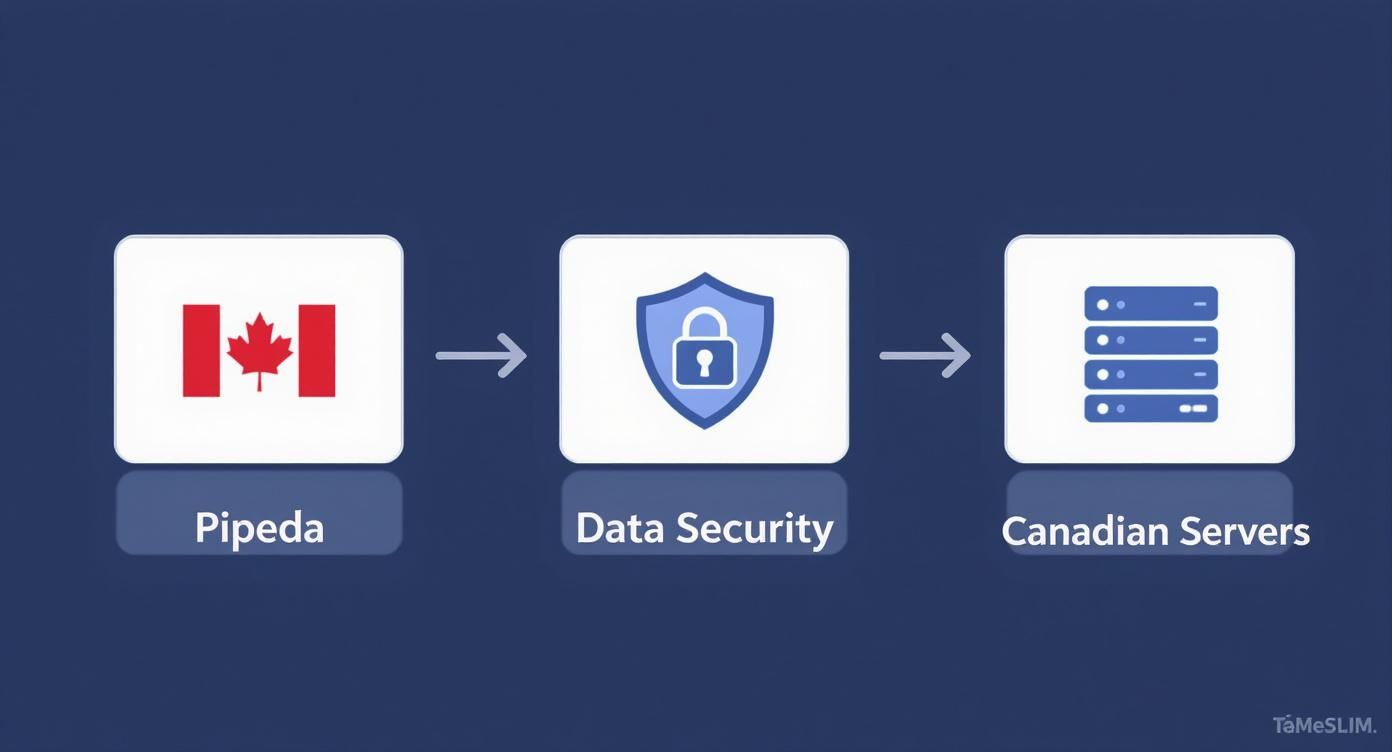If you’ve ever felt like you’re piecing together a puzzle with half the pieces missing when you look at client files, renewal dates, and commission statements, you’re not alone. Generic CRM systems often fail to understand the unique needs of the insurance industry. A dedicated insurance CRM software for Canada isn't just a contact list; it’s the command centre for your entire brokerage, designed to manage relationships, automate the grunt work, and keep policyholders happy.
Why Canadian Insurance Agencies Need a Specialised CRM

Think of a standard CRM as a family saloon – it’ll get you from A to B. An insurance-specific CRM, on the other hand, is more like a specialised transport vehicle, built from the ground up for its unique cargo. It's designed to manage the entire policyholder lifecycle, which is a far more intricate journey than a simple sales transaction. Understanding the Customer Relationship Management (CRM) basics is a great starting point, but the insurance industry adds layers of complexity.
Here in Canada, the insurance market has its own set of rules and cultural nuances. A one-size-fits-all CRM just can't keep up. For Canadian agencies, having software that understands our specific environment isn't a luxury; it's a necessity.
Navigating the Unique Canadian Market
Canadian insurance brokers deal with challenges that generic software simply wasn't built to handle. These off-the-shelf systems often miss the mark on the operational details that define our industry. A specialised platform, however, is engineered to meet these needs head-on.
Here are a few of the key hurdles:
Complex Provincial Regulations: Every province plays by its own rules when it comes to insurance products and data privacy. You need a system that can adapt to different compliance requirements without causing a headache.
Bilingual Client Service: In many parts of Canada, serving clients fluently in both English and French is non-negotiable. This means your CRM needs a truly bilingual interface and communication tools, not just a clumsy add-on.
Diverse Product Portfolios: Juggling life, P&C, and group benefits is common. This requires a flexible system that can track wildly different policy types, commission structures, and renewal cycles all in one place.
A purpose-built insurance CRM isn't just about working faster. It's about embedding compliance and a client-first mindset into every single thing you do. That’s how you gain a real competitive edge in a crowded market.
Taking this a step further, investing in custom software development allows an agency to build a system that fits its unique processes, client base, and growth plans like a glove. This bespoke approach ensures your technology supports your business strategy, not the other way around. By choosing the right partner, agencies can create a powerful asset that fuels growth and deepens client trust for years to come.
Key Features for Canadian Insurance CRM Software

It’s easy to get overwhelmed by feature lists when you're looking for an insurance CRM. But for Canadian agencies and brokerages, the generic solutions just don't cut it. The right platform needs to be built for our specific market, addressing everything from our two official languages to our distinct provincial regulations.
Think of a good insurance CRM software Canada not as a simple database, but as the central nervous system of your entire operation. It should be the difference between a system that just holds information and one that actively helps you build lasting client relationships, simplify your daily grind, and drive real growth.
Essential vs. Advanced Features for Canadian Insurance CRMs
When evaluating your options, it's helpful to separate the absolute must-haves from the features that will give you a serious competitive edge as you grow. The essentials are the foundation of any solid insurance CRM, while the advanced functions are what set the market leaders apart.
Here's a breakdown to help you see the difference:
| Feature Category | Essential Functionality | Advanced Functionality (for growth) |
|---|---|---|
| Client & Policy Management | Centralised client profiles with contact history. Basic policy tracking for renewals and claims. | 360-degree client view with integrated communication logs, document storage, and family/business relationship mapping. Automated, multi-step renewal workflows. |
| Canadian Compliance & UI | Bilingual (English/French) interface for staff and basic client communication. Support for Canadian Dollar (CAD). | Full bilingual support across all modules, including client portals and marketing automation. Multi-currency support (CAD/USD) for cross-border business. Province-specific compliance rule automation. |
| Sales & Commission Tracking | Simple lead tracking and a basic sales pipeline. Manual or spreadsheet-based commission calculations. | Visual sales funnels with conversion rate tracking. Automated commission splits and producer-specific reporting. Predictive analytics for lead scoring. |
| Analytics & Reporting | Pre-built, standard reports on sales and policy counts. | Customisable dashboards with real-time KPIs. In-depth agent performance metrics and client retention analysis. |
While every Canadian insurance business needs those essential functions to operate, investing in the advanced features is what really unlocks efficiency and allows you to scale effectively.
Core Policy and Client Management
At its absolute core, your CRM must deliver a complete, 360-degree view of every single client. This is so much more than just a name and a phone number; it’s about having their entire journey with your agency available at a glance.
Your system should be able to handle:
Comprehensive Policy Tracking: You need to manage every policy type – P&C, life, group benefits, you name it – all in one place. This means no more toggling between different systems just to see coverage details, premiums, or important dates.
Automated Renewal Workflows: The system should be your safety net, automatically flagging upcoming renewals and triggering reminders for both your team and your clients. This kind of proactive work is huge for boosting retention and stopping policies from lapsing.
Streamlined Claims Processing: When a client files a claim, they need you at your best. A good CRM lets you track a claim from the first call to the final resolution, with a dedicated space to log details, upload documents, and monitor every step. It brings much-needed clarity during a stressful time.
Must-Have Canadian-Specific Functionalities
Beyond the basics of insurance, your CRM has to be built for our market. These aren't just "nice-to-haves"; they're non-negotiable for any agency serious about operating across Canada.
A truly Canadian-focused CRM delivers:
Bilingual (English/French) Interface: To properly serve clients from coast to coast, your platform needs a flawless, fully functional interface in both of Canada's official languages. This applies to everything from your team's dashboard to the email templates your clients receive.
Multi-Currency Support: If you work with clients or carriers who operate in different currencies, the ability to manage and report on transactions in both CAD and USD is essential for clean and accurate bookkeeping.
The real power of a specialised CRM lies in its ability to handle the small details that define the Canadian insurance industry. From bilingual communication to province-specific commission structures, these features turn a good system into an indispensable one.
Sales and Performance Analytics
A modern CRM is also your most powerful tool for growth. It needs to give you a clear, honest look at your sales pipeline and tell you exactly how your business is performing. This is where expert CRM software development truly proves its worth, creating dashboards that deliver actionable insights, not just a mountain of raw data.
Look for strong analytics that let you:
Manage Leads and Funnels: See the entire journey a prospect takes, from the first point of contact to a signed policy. Visual sales funnels are amazing for spotting where deals are stalling and helping your team focus on the best opportunities.
Track Commissions Accurately: We all know how complicated insurance commissions can get. Your CRM should have a smart module that calculates and tracks commissions automatically, for different products, carriers, and producers, slashing admin time and eliminating costly errors.
Generate Insightful Reports: Customisable dashboards give you a live snapshot of your most important key performance indicators (KPIs), like new policy sales, client retention rates, and individual agent productivity. This is the information you need to make smart, strategic decisions for the future.
Navigating Canadian Compliance and Data Security
In the insurance world, trust isn't just part of the business – it's the entire foundation. You’re handling incredibly sensitive client information, which means compliance isn't a box to tick; it's non-negotiable. For any Canadian agency, this means grappling with a specific set of rules that demand a CRM built with data security at its absolute core.
Think of the right platform as your first and best line of defence against regulatory headaches and data breaches. This isn't about adding another layer of complexity. It's about embedding security and compliance right into your daily operations, right from the start.
Understanding PIPEDA and Provincial Privacy Laws
At the heart of Canadian data privacy is the Personal Information Protection and Electronic Documents Act (PIPEDA). This is the federal law that governs how private-sector organisations collect, use, and disclose personal information. For an insurance agency, this covers everything from a client's name and address to their detailed policy and claims history.
A PIPEDA-compliant CRM isn't a feature; it's a requirement. It ensures client data is handled ethically, consent is properly documented, and information is used only for its intended purpose. That’s how you build the client confidence that leads to long-term loyalty.
But it doesn't stop at the federal level. You also have to keep a close eye on provincial legislation, as some provinces have their own privacy laws that are considered "substantially similar" to PIPEDA, but with their own unique twists.
Quebec (Law 25): Quebec's updated privacy law is one of the strictest in North America. It demands explicit consent, mandatory privacy impact assessments, and brings hefty penalties for non-compliance.
Alberta (PIPA): The Personal Information Protection Act in Alberta governs how provincially regulated private-sector organisations handle personal information.
British Columbia (PIPA): Much like Alberta, BC's PIPA sets the rules for data collection, use, and disclosure within the province.
Your CRM has to be flexible enough to handle these regional nuances, making sure you stay compliant no matter where your clients call home.
Non-Negotiable Security Features for Your CRM
To protect your clients and your agency, certain security features are absolutely essential. When you’re evaluating a potential CRM, these are the table stakes – the bare minimum. They show that a vendor is truly committed to safeguarding your most valuable asset: your client data.
Building a secure system from the ground up is also a key focus of professional insurance CRM software development. We dig deeper into these unique industry challenges in our guide to cybersecurity in the insurance sector.
Here are the critical security pillars to look for:
Data Hosting in Canada: This is paramount. Storing client data on servers located within Canadian borders ensures it falls under Canadian privacy laws like PIPEDA. It also gives clients peace of mind knowing their sensitive information isn't crossing any borders.
End-to-End Encryption: All data, whether it's sitting on a server ("at rest") or being sent over a network ("in transit"), must be encrypted. This basically scrambles the information, making it completely unreadable to anyone without the right key.
Granular Access Controls: Not everyone on your team needs to see everything. A secure CRM lets you set specific user permissions, ensuring employees can only access the client information that's absolutely necessary for their job.
The Role of CRM in Building a Secure Agency
Your CRM is more than just a tool for compliance; it's central to building a culture of security. Automating secure workflows and providing clear audit trails helps minimise human error and gives you a transparent record of who accessed what data, and when. This structured approach is vital for proving due diligence to both regulators and clients.
The market for Canada Insurance Agency Software is poised for significant growth, largely driven by the high demand for CRMs that are tailored to these local regulatory frameworks. Projections show cloud-based solutions will lead the way, mirroring a North American trend where the cloud commands over 65% of revenue share. And with 70% of CRM systems globally expected to have AI functions by 2025, Canadian insurers are adopting these technologies to stay both competitive and compliant.
Ultimately, choosing a CRM with robust, Canadian-centric security and compliance features is an investment in your agency's reputation and future. It's about building a system designed not just for efficiency, but for lasting client trust.
Integrating Your CRM for a Seamless Workflow
An insurance CRM that stands alone is like a library with no card catalogue – all the information is there, but finding what you need is a frustrating, manual chore. When your CRM doesn't talk to your other essential tools, you create data silos. This forces your team to constantly jump between systems, re-entering the same information and inevitably making mistakes along the way.
The real magic happens when your CRM becomes the central hub, connecting everything from policy administration to marketing. The goal isn't just to have a CRM; it's to build a unified ecosystem where information flows freely. This gives your team a complete, up-to-the-minute picture of every client relationship.
This isn't just about convenience; it creates a powerful multiplier effect. When your CRM is in sync with your other software, you eliminate duplicate work and unlock much deeper insights. This interconnected approach is what turns a good insurance CRM software Canada system into the operational backbone of your business.
Core Integrations for Canadian Agencies
For any modern Canadian insurance agency, a few key integrations are simply non-negotiable. Think of these as the foundation for an efficient, data-driven operation.
Policy Administration Systems (PAS): This is the most crucial connection. Linking your CRM with your PAS means client details, policy numbers, coverage limits, and renewal dates are always perfectly synchronised. Your brokers get instant access to accurate policy data directly within the client’s CRM profile, saving them from having to dig through another system.
Accounting Software: Imagine automating your invoicing and commission tracking. By connecting your CRM to platforms like QuickBooks Canada or Sage, a new or renewed policy can automatically trigger an invoice. Commission data flows right into your financial system, cutting out hours of tedious admin work.
Email and Marketing Platforms: Integrating your CRM with tools like Mailchimp or Constant Contact lets you build incredibly personal marketing campaigns. You can segment clients by policy type, renewal date, or even their postal code to send targeted messages that actually resonate. To explore this further, you can learn more about how tailored insurance software solutions can seriously upgrade your marketing game.
This concept map shows how to build a compliant and secure integration strategy, balancing PIPEDA, data security, and Canadian data hosting.

As the visual highlights, a successful integration plan must be built on a rock-solid foundation of compliance and security to keep your clients' trust.
Advanced Integrations for a Competitive Edge
Once you have the basics covered, you can start exploring advanced connections that truly set your agency apart. These are the integrations that separate the market leaders from the rest of the pack.
A fully integrated CRM ecosystem provides a true 360-degree view of the client. It’s not just about what policy they have; it’s about understanding their entire history and anticipating their future needs with unparalleled precision.
Here are a few advanced integrations worth considering:
Carrier Quoting Engines: Picture this: your brokers generate quotes from multiple carriers without ever leaving the CRM. A direct link to carrier portals lets them pull real-time quotes, compare the options side-by-side, and present them to a client in minutes. It completely changes the speed of your sales cycle.
Customer Support Portals: When you connect your CRM to a support portal like Zendesk, every client ticket, question, and resolution gets logged right in their profile. Your whole team can see the full service history, so clients never have to waste time repeating themselves.
Telematics and IoT Data: This is a game-changer for P&C insurers. Integrating telematics data gives you a window into client behaviour, allowing you to offer personalised pricing, reward safe driving, and make far more accurate risk assessments – all managed within the CRM.
In the end, a smart integration strategy turns your CRM from a simple database into the command centre for your entire agency. This approach is a core part of effective insurance CRM software development, designed to boost efficiency, improve service, and drive real growth.
How to Choose the Right CRM Vendor in Canada
Picking the right software is a huge step, but finding the right partner to install and support it is just as critical. The best insurance CRM software Canada can fall flat if the vendor behind it doesn't get your business, the Canadian market, or the specific quirks of our insurance industry. A vendor isn't just selling you a product; they're a long-term partner in your agency's future.
This partnership goes way beyond the technology itself. It’s about finding a team with real-world experience, a solid grasp of local regulations, and the ability to provide support that's both accessible and timely. The right vendor is a guide, helping you through the maze of implementation, data migration, and team training to make sure you get the best possible return on your investment.
Core Criteria for Evaluating Vendors
When you start looking at potential partners, it’s easy to get buried in sales pitches and feature lists. To cut through the noise, you need to zero in on a few core criteria that reveal a vendor's actual capabilities and their commitment to the Canadian insurance space.
A vendor's expertise should be obvious from their track record and client stories. You want to see proof that they deliver real results. This insight helps you figure out if their values and experience truly line up with your agency's long-term goals.
Here’s what to look for:
Proven Canadian Insurance Experience: Always ask for case studies or references from other Canadian insurance agencies. A vendor who has already tackled projects like yours is much more likely to understand your specific pain points.
Deep Regulatory Knowledge: They need to be fluent in the language of PIPEDA, Quebec's Law 25, and other provincial privacy laws. This isn't just a nice-to-have; it's a must for building a compliant system from the ground up.
Local Support and Presence: Having access to a support team in Canadian time zones is a massive plus. It means you can get help when you actually need it, not when it's convenient for a team halfway around the world.
A Clear Implementation Roadmap: A partner you can trust will lay out a detailed, transparent plan for implementation. This should cover everything from the initial discovery phase to the final go-live and ongoing support.
The market for Insurance CRM Software in Canada is growing, mirroring the broader North American shift toward digital tools. Globally, the market was pegged at around USD 2.5 billion in 2023 and is expected to hit USD 6.2 billion by 2032. Much of this growth is driven by cloud-based solutions that offer flexibility and better cost management. This trend highlights why it's so important to pick a vendor who is not just stable but also looking ahead. You can learn more about these market trends and forecasts at DataIntelo.com.
Key Questions to Ask During Demos
A software demo is your chance to look past the slick presentation. It's an opportunity to see how the system and the vendor handle the real-world scenarios your agency faces every day. Don't just sit back and watch; come armed with pointed questions that put their expertise to the test.
The point of a demo isn't just to see what the software can do. It's to find out if the vendor truly understands what you need to do. A great partner will connect every feature back to a real business outcome for your agency.
Come prepared with questions that show you mean business:
Compliance and Data: "How does your platform ensure we stay compliant with both PIPEDA and provincial laws like Quebec's Law 25? And where, physically, will our client data be stored?"
Customisation and Scalability: "Can you show me how we would customise a workflow for a complex commercial P&C policy? How would that differ from a simple life insurance policy?"
Implementation and Training: "What does your typical implementation look like for an agency our size? What kind of training and ongoing support can our brokers expect?"
Long-Term Partnership: "What does your product roadmap look like for the next 18 months? How do you actually use client feedback to shape future updates?"
Asking these questions helps you judge not just the software's features, but the vendor's depth of knowledge and their commitment to a genuine partnership. Choosing the right partner for your insurance CRM software development is a strategic move that will shape your agency for years to come. For more ideas, check out our guide on key considerations for insurance software solutions in Canada to help round out your evaluation checklist.
Your Next Steps to a Modern Insurance Agency
Alright, we've covered a lot of ground. You now have a solid understanding of what a modern insurance CRM software in Canada should look like – one that’s built for our specific market, handles compliance with ease, and comes loaded with the features that actually matter. But knowing is only half the battle. Now it’s time to put that knowledge into action.
The best place to start is with a hard look at your own agency. Get your team together and map out your current processes, from quoting a new policy to handling a claim. Where are the hang-ups? Are your brokers bogged down by manual data entry? Are you missing out on renewal opportunities because they’re buried in a spreadsheet somewhere? These are the real-world problems a CRM is meant to solve, and identifying them is your first crucial step, as we explored in our end-to-end software development guide.
As you start to plan this move, getting a handle on how to implement a CRM system is going to save you a world of headaches. It helps you set the stage for everything from migrating your data to training your staff and creating a timeline that makes sense.
Partnering for Success
Once you’ve got a clear picture of what you need, it’s time to find the right partner to help you build it. This isn't just about buying software off the shelf; it's about finding a team that understands the insurance world and can act as a strategic ally. A partner with a track record in insurance CRM software development won't just build you a tool – they'll guide you through the entire process, making sure the final product is a perfect fit for your agency's unique ambitions.
Remember, the point of a CRM project isn’t just to install new software. It’s about building a more efficient, client-focused, and ultimately more profitable agency. The right technology partner gets that and works alongside you to deliver real business results.
Creating a custom solution is a major step forward for your agency's future. It demands a partner with serious technical skill and a true investment in your success. To see how we've helped businesses just like yours grow, take a look at the team behind Cleffex on our about us page.
Frequently Asked Questions
It's only natural to have a few questions when you're looking into specialised software. Here are some of the most common ones we hear from Canadian brokers, agents, and insurers thinking about a new insurance CRM.
Why Can't I Just Use a Generic CRM for My Canadian Insurance Agency?
It’s a fair question. While a standard CRM is fine for tracking basic sales leads, it just wasn't built for the world of insurance. Think of it like using a family car to do a construction job – it can move a few things, but it's not a dump truck.
An insurance CRM is designed from the ground up to handle policies, manage claims from the first call to the final payout, and automate those tricky renewal workflows. It also knows how to deal with complex commission structures. On top of that, a system truly made for the Canadian market comes with full bilingual support out of the box and is built to comply with regulations like PIPEDA. Sticking with a generic system usually means creating awkward workarounds, wasting valuable time, and opening yourself up to serious compliance risks.
How Long Does It Take to Implement a Custom Insurance CRM?
The honest answer? It depends. The timeline for a custom insurance CRM software Canada project hinges on a few key things: how complex your needs are, how much data you need to move over from your old systems, and how many other tools you need it to connect with.
You can generally expect a custom CRM project to take anywhere from three to nine months. That window covers everything from the initial planning and design, through the actual development and testing, and right up to training your team.
Working with an experienced insurance CRM software development partner is the best way to keep the project on track. A good team will manage the deadlines, anticipate problems before they happen, and make sure the final product gets delivered on time and ready to go. This kind of strategic CRM software development makes the whole transition much smoother.
Is My Client Data Secure in a Cloud-Based Insurance CRM?
Yes, absolutely – provided you choose a vendor who takes security as seriously as you do. Reputable cloud CRMs use robust security measures like end-to-end data encryption and multi-factor authentication to keep your client information safe.
For any Canadian insurance business, it’s also critical to pick a provider that stores your data on servers located inside Canada. This isn't just a "nice-to-have"; it's a key part of complying with data residency rules under PIPEDA and other provincial laws. Always do your homework and check a vendor's security certifications and data policies before you commit. It’s a small step that protects both your clients and your agency’s hard-earned reputation.
At Cleffex, we build custom software that solves the real-world problems facing the Canadian insurance industry. Our CRM platforms are secure, compliant, and designed to help your agency thrive. Ready to see what a modern system can do for you? Contact us at https://www.cleffex.com/contact-us/ to find out how we can help.







